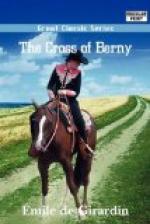Occasionally a glimmer of reason would cross my confused brain, and I would soliloquize: Why am I disgracing myself in this way before all these people? What possesses me to act in concert with these drunken fools and bold women? I must rush out and apologize to the first person I meet!
It was impossible for me to follow my good impulse—some unseen hand held me back—some mysterious influence kept me chained to the spot. We are influenced by magic, although magicians no longer exist!
Between the acts, our two Greek statues criticised the audience in loud tones, and their remarks, seasoned with attic salt, afforded a peculiar supplement to the choir of Antigone.
“Those four women on our right must be sensible people,” said our blonde statue; “they have put their show-piece in front. I suppose she is the beauty of the party; did you ever behold such dreadful bonnets and dresses? They must have come from the Olympic Circus. If I were disfigured in that way, I would be a box-opener, but never would be seen in one!”
“I think I have seen them before,” said the bronze statue; they hire their bonnets from the fish-market—disgusting creatures that they are!”
“What do the two in the corner look like, my angel?”
“I see nothing but a shower of curls; I suppose she found it more economical to curl her hair than to buy a bonnet. Every time I stretch my neck to get a look at her, she hides behind those superb bonnets.”
“Which proves,” said Ernest, “that she is paradoxically ugly.”
“I pity them, if they are seeking four husbands,” said George; “and if they are married—I pity their four husbands.”
Whilst my noisy companions were trying to discover their ideal fright in the corner of the box on our right, I felt an inexplicable contraction of my heart—a chill pass through my whole body; my silly gayety was by some unseen influence suddenly changed into sadness—I felt my eyes fill with tears. The only way I could account for this revulsion in my feelings was the growing conviction that I was disgracing myself in a den of malefactors of both sexes. My fit of melancholy was interrupted very opportunely by the choir chanting the hymn of Bacchus, that antique wonder, found by Mendelssohn in the ruins of the Temple of Victory.
When the play was over, I timidly proposed that we should remain in our box till the crowd had passed out; but our Greek statues would not hear to it, as they had determined upon a triumphal exit. I was obliged to yield.
The bronze statue despotically seized my arm, and dragged me toward the stair. I felt as if I had a cold lizard clinging to me. I was seized with that chilly sensation always felt by nervous people when they come in contact with reptiles.
I recalled the disastrous day that I was shipwrecked on the island of Eaei-Namove, and compelled to marry Dai-Natha, the king’s daughter, in order to escape the unpleasant alternative of being eaten alive by her father. On the staircase of the Odeon I regretted Dai-Natha.




